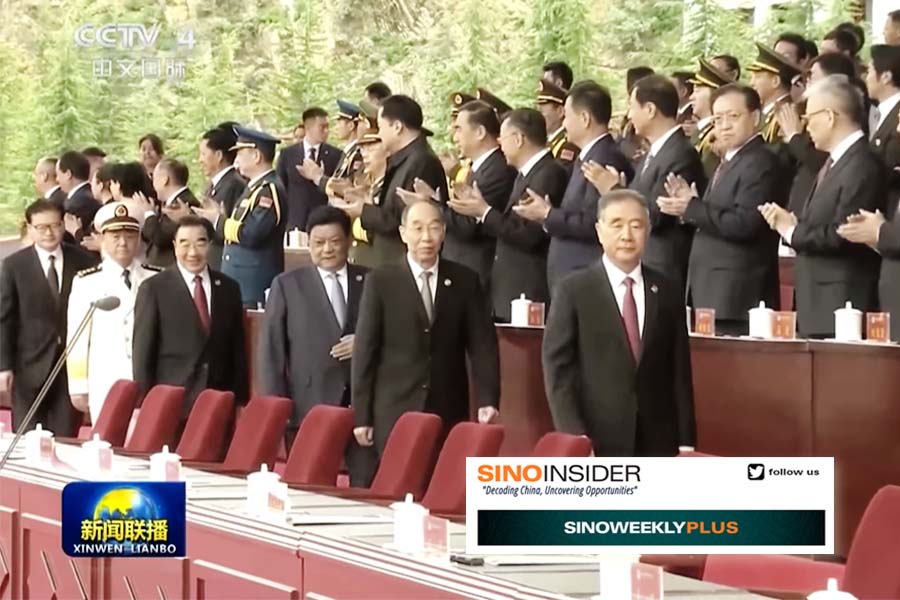◎ The following analysis was first published in the August 26, 2021 edition of our subscriber-only SinoWeekly Plus newsletter. Subscribe to SinoInsider to view past analyses in our newsletter archive.
The political future of Wang Yang, the four-ranking Politburo Standing Committee member and chairman of the Chinese People’s Political Consultative Conference (CPPCC), recently became a topic of speculation in the Chinese language China-watching sphere in light of the following developments:
1. On Aug. 17, Wang Yang was one of five Politburo Standing Committee members who attended (出席) the tenth meeting of the Central Financial and Economic Affairs Commission on promoting “common prosperity” (共同富裕) and handling major financial risks. State media listed Wang after Xi Jinping and Li Keqiang in noting the senior officials in attendance, meaning that he “outranked” Central Financial and Economic Affairs Commission members Wang Huning and Han Zheng at the meeting and had a say in policy decisions and work.
Wang Yang was previously listed as having “participated” (参加) in Central Financial and Economic Affairs Commission meetings (the first and the fourth) where the “moderately prosperous society” (小康社會) policy direction was discussed. At the time, state media mentioned Wang’s attendance after listing members of the commission.
2. On Aug. 19, Wang Yang attended an event to mark the CCP seventh decade in control (“peaceful liberation”) over Tibet in the region’s capital of Lhasa. The event, which was held at the base of the sacred Buddhist site Potala Palace, featured a four-storey high portrait of Xi Jinping and another with all five generations of CCP leaders. During his speech, Wang said he was “entrusted” by Xi to lead the Party Central delegation to attend the event and extend his congratulations.
Some Chinese observers speculated that Wang Yang attending the 70 anniversary Tibet event possibly “signaled” his status as Xi Jinping’s successor because Hu Jintao and Xi attended the 50th and 60th anniversary events respectively and both men ended up becoming CCP General Secretary later on. And if Wang is indeed Xi’s designated successor, then this means that the latter was “defeated” at the recent Beidaihe meeting and is preparing to step aside at the 20th Party Congress in 2022, observers say.
3. Around the time of the conclusion of the Beidaihe meeting (mid-August), rumors started circulating on the internet regarding an anonymous “high-ranking CCP official” claiming that Wang Yang was “possibly” replacing Xi Jinping as CCP General Secretary.
Overseas Chinese commentators and media outlets seized upon the rumor and issued a several analyses, the most prominent of which include:
- The recent Beidaihe meeting did not go well for Xi Jinping.
- Xi prefers Wang Yang over Li Keqiang to succeed him because he has disagreements with the latter.
- Xi has exhausted all his options in countering an America that loathes Xi and is getting tough on China across the board, including investigating the origins of the coronavirus. Thus, Xi deliberately released disinformation about Wang Yang succeeding him in order to “appease” or “confuse” the U.S., with the logic being that the “softer” character of Wang would “persuade” Washington to weaken its stance on China.
OUR TAKE
Making sense of rumors and information about the CCP and factional struggle is always challenging. Unofficial information is usually vague and often contains a mix of part-truths and falsehoods; this is unavoidable given the difficulties of getting sensitive information out from a totalitarian environment and compounded by communication in Chinese culture being oftentimes indirect. But analysts can still have a good idea of what is noise and what is signal by juxtaposing unofficial information with official information, and having a working understanding of CCP characteristics, operations, and factional struggle.
The idea that Xi Jinping would put out disinformation about a potential successor to throw the U.S. off his case may seem logical at first glance, given the Party’s characteristics. Deceit is second nature to the CCP and the regime is preoccupied with survival and domination.
However, the CCP’s recent rhetoric on America’s withdrawal on Afghanistan (a signal of U.S. decline and global hegemony; intimidating Taiwan and U.S. allies, etc.) and renewed efforts at rehashing disinformation about the origins of the coronavirus (“it came from Fort Derrick”) indicates that it is doubling down, not letting up, on its “wolf warrior” approach. If anything, the CCP appears to have recently gotten concessions from the U.S.; an Aug. 25 Reuters report noted that “the U.S. has granted licenses authorizing suppliers to sell chips to Huawei for such vehicle components as video screens and sensors” in “recent weeks and months,” citing people familiar with the matter.
The Biden-Harris administration’s botched Afghanistan pullout would convince Beijing even more that it is absolutely correct in promoting its narrative of a rising East and declining West (東升西降). Hence, it does not make sense for Xi to be spreading unreliable disinformation about his stepping aside in the hopes of somehow duping a “dominant” U.S. (a review of the Biden-Harris administration’s approach to the CCP indicates that it is adulterating Trump’s “China challenge”) into relaxing its stance on China. Indeed, Beijing has no use for parlor tricks when the current White House is inviting doubts about its competency in handling Afghanistan and as the CCP is busy undermining America (influence operations, financial strategy, fentanyl shipments, espionage, etc.) and setting itself up as the new global hegemon.
Wang Yang’s seemingly unusual public appearances are actually in line with Party protocol. Wang has attended Central Financial and Economic Affairs Commission meetings when the meeting topic concerns his political advisory/united front work portfolio (many prominent businessmen, executives, and celebrities are CPPCC members), and the recent meeting is no exception. And Wang was likely handed a greater role in the meeting about promoting “common prosperity” because CPPCC work is essential for “maintaining stability” and preventing financial risks when the CCP starts extracting wealth from the rich and redistributing it to the middle and lower classes. Put another way, Wang Yang had an “elevated” presence at the tenth meeting of the Central Financial and Economic Affairs Commission due to his work portfolio, and not because of some change in his political status.
Wang Yang’s CPPCC portfolio is also almost certainly the main reason why he was selected to go to Tibet to commemorate the 70th anniversary of CCP control over the region as Xi’s representative. The argument that Wang is being prepared to be Xi’s successor because Hu Jintao and Xi Jinping attended the 50th and 60th Tibet control anniversary events respectively does not hold water as the political rules of the game during the Jiang faction’s era of dominance (1997 to 2012) changed substantially after Xi took office. For instance, Xi broke political norms by purging an “untouchable” former Politburo Standing Committee member (Zhou Yongkang) in his first term, and took a series of controversial moves (abolish presidential term limits; not designating a successor; appointing a non-Politburo member [Wang Qishan] as PRC vice president) early into his second term to consolidate power and prolong his leadership tenure.
Finally, Xi Jinping has zero incentive from a factional struggle perspective to be putting out disinformation about a successor. CCP factional struggle is a brutal, “you die, I live” affair, and Xi can ill-afford to step aside now, with his control over the regime more tenuous than appearances suggest, and with many enemies waiting to extract retribution the moment he relinquishes power. If anything, Xi’s ambitions about staying in power are made abundantly clear in the Aug. 15 Qiushi article that called on Party members to be loyal to Party Central (“with Comrade Xi Jinping at the core”) and warned against factional activity against his leadership. The fact that Xi’s foreign enemies felt the need to put him on notice around the conclusion of the Beidaihe meeting hints at a stalemate rather than Xi being “defeated” and being forced to designate a successor.
The origins of the “Wang Yang successor” rumors may be less mysterious than appearances suggest. While Xi’s enemies are naturally suspect, the vagueness of the rumors and their prior warnings to Xi Jinping means that Xi’s rivals were either engaging in an extremely feeble attempt to undermine the latter or they were not the source of the rumors. Rather, the rumors appear to be derived from the speculation of overseas Chinese commentators and media outlets who read too much into recent elite personnel activity; like a game of telephone, the information/speculation changes after it is circulated numerous times. With the Wang Yang rumors getting “laundered” in the overseas Chinese press, however, Xi’s rivals now have opportunities to weaponize the misreporting against him.













